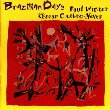|
|

Paul Winter & Oscar Castro-Neves The year was 1962. Prior to the historic Carnegie Hall Bossa Nova concert, that same year, Oscar Castro-Neves met a young American musician named Paul Winter. An instant kinship, as Castro-Neves defines it, was formed. Brazil's guitarist-composer Castro-Neves then reconnected with soprano sax player Winter later in the 60's. The rest is now history. Castro-Neves and Winter have collaborated in several projects, such as Paul Winter's Earthbeat, Missa Gaia, and Canyon, and in Oscar Castro-Neves's own solo debut Oscar! Thirty-six years later, these talented musicians finally come to realize their long-standing dream of a duet recording. Brazilian Days is the result of such endeavor. Joining Winter and Castro-Neves, bassist Nilson Matta and drummer Paulo Braga complete the quartet. The repertoire selection was carefully chosen to cover Brazilian composers pre-Bossa Nova era, such as Noel Rosa, to Bossa Nova household names, such as Vinícius de Moraes, Tom Jobim, Edú Lobo, and Carlos Lyra. Researching these songs was no easy task, but besides these artists' involvement with Brazilian music, Winter and Castro-Neves had the help of Brazilian publisher Almir Chediak's songbook series. Brazilian Days then presents us with excellent performers playing outstanding music. In addition to that, we are given special appearances by Paul Halley (pipe organ) and Cássio Duarte (percussion). When Duarte's percussion opens the first track with Castro-Neves solo, Brazilian Days is very good. Aula de Matemática (A Mathematics Lesson) is a bouncy example of a bossa nova tune with clever lyrics (here absent, unfortunately). The impression one gets from this opening track is that these musicians are truly enjoying performing this music. Winter's soprano sax is vibrant and Castro-Neves's guitar accompaniment is at its best. With Carlos Lyra and Vinícius de Moraes's Coisa Mais Linda, the mood shifts to a more romantic tone. It is inevitable not to associate Winter's mellow soprano sax with saudade, that hard-to-define Brazilian word that conveys both the sadness and joy of missing loved ones and places. Unfortunately, the combination of excellent musicians and outstanding compositions does not equate with success. Brazilian Days falls into a sameness that is detrimental to the overall result. The uniformity of the arrangements backfires. Half way through Brazilian Days, I can no longer distinguish what song is being played. As a listener, I am left with the saudade for more sagacity from these musicians and capturing performances to hold me looking forward to the next track. Of course, there is always a next project, and I truly hope that Winter and Castro-Neves rejoin forces in another Brazilian project. Copyright © 1998 Egídio Leitão
|
| © 2011 Luna Kafé |